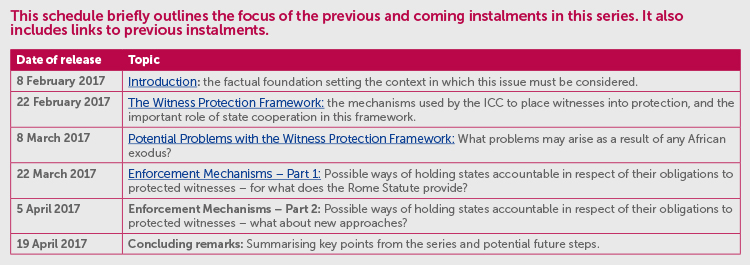Enforcing ICC witness protection obligations: Part 2
As the Rome Statute of the International Criminal Court (Rome Statute) itself does not contain an effective mechanism to enforce witness protection obligations, it is necessary to look beyond the confines of strict international criminal law.
Article 87(4) of the Rome Statute provides that the International Criminal Court (ICC or Court) may take “measures … as may be necessary to ensure the safety or physical or psychological well-being of any victims, potential witnesses and their families”. A possible way of addressing non-compliance in the event of an African walkout could be through bringing these issues before the domestic courts in the protective states.
A glaring weakness of the option of ensuring enforcement of this option is the fact that everything about witness relocation is confidential. The existence of these agreements and their contents is not public information, so even if someone in a position to take action did become aware of a particular set of facts which may necessitate further legal action, how would they know the extent of the obligations of the protective state?
This problem may not be insurmountable though. There may be are two routes open to the ICC to ensure enforcement through domestic courts:
1) partnerships with independent, local organisations; or
2) extending the Victims and Witnesses Section’s (VWS) role to include a more active role in monitoring compliance with relocation agreements.
Independent partner organisations
Partnerships between the Court and local non-government entities are not unprecedented. By expanding the list of organisations involved in witness protection under the International Criminal Court Protection Programme (ICCPP), one also expands the list of fora available to those organisations to ensure compliance. This is so as, theoretically, different organisations may have standing to bring legal action before different judicial or quasi-judicial bodies in each state. However, unless the protective states have legislation permitting civil society organisations to launch proceedings in the interests of a third party, they may not be able to institute proceedings at all.
An alternative solution may be for the witness to act in her own name. Under ordinary circumstances, this may depend on whether she is herself a party to the relocation agreement. If the witness is aware of a breach or threatened breach of the obligation (which she may not be), however, she is likely to be prejudiced in any litigation of this nature due to her lack of knowledge of the protective state’s legal system. Even if she is aware that she can institute proceedings in a bid to protect herself, she may lack the necessary funds to pursue legal action.
A further alternative may be for the ICC to act in its own name to enforce the obligations under the relocation agreement. This would likely bring it within the standing provisions in many jurisdictions given that it would be a contracting party to the relocation agreement in issue before the domestic court.
In these two alternatives, partnerships with local organisations would not be rendered nugatory. As the local organisations will be located within the protective state, they will have a greater knowledge of the political situation there and will be able to monitor the witness more effectively. This extended network would also provide the witness with easier access to immediate security assistance should she feel threatened.
A domestic organisation’s more specialised knowledge of the local court system will also enable the ICC or the witness to bring litigation before the domestic courts more easily. The ability to bring urgent proceedings, and more tangible enforcement options (such as access to a police force) mean that there is a more realistic chance of effective action being taken to ensure that the witness remains protected.
Entering into a partnership with a local organisation would entail a careful selection of the right organisation committed to the goals of the Court and the ICCPP, with a robust operational structure and ethic such that increasing the number of parties with access to the confidential information would not increase the risk to the protected person by any significant degree. The Court, through its Registry, would also have to negotiate a watertight contract with the independent organisation to ensure that its confidentiality obligations are inescapable and the precise scope of its mandate is clear.
Extended Registry involvement
An alternative solution – which broadly addresses the confidentiality concerns set out above – is to create greater means for the ICC’s Registry to monitor the witness once she has been relocated. This could be achieved through increasing the capacity of the VWS in its offices on the ground in situation countries.
An unavoidable consequence of this option is an additional burden on the VWS in terms of monitoring the ongoing risk status of witnesses, something which the Court prefers to leave to protective states. This also means that the Court may require additional resources in order to implement this solution, both human and financial.
Neither of these solutions is perfect. Therefore, the conclusion to be drawn from this analysis is that there is very little to provide witnesses with a sense of comfort that the ICC will be able to ensure their protection once they have entered the ICCPP. The implications of this will be considered in the final alert in this series.

Public Law
News Bulletin
South Africa will appear before the Pre-Trial Chamber of the International Criminal Court (Court) on Friday, 7 April 2017 to account for its failure to arrest Sudanese President Omar al-Bashir when he attended the 2015 African Union Summit in the country. South Africa has been invited to make written and oral submissions at the hearing on this issue. The Court will then decide whether South Africa failed to comply with its obligations under the Rome Statute of the International Criminal Court by failing to arrest President al-Bashir. Should a finding of non-compliance be made, the matter may be referred to the Assembly of States Parties (Assembly). For our exploration of the powers of the Assembly in cases of non-compliance by a States Party, see the previous alert in this series. For more information failure to arrest President al-Bashir in 2015, see the first alert in this series.
The information and material published on this website is provided for general purposes only and does not constitute legal advice. We make every effort to ensure that the content is updated regularly and to offer the most current and accurate information. Please consult one of our lawyers on any specific legal problem or matter. We accept no responsibility for any loss or damage, whether direct or consequential, which may arise from reliance on the information contained in these pages. Please refer to our full terms and conditions. Copyright © 2026 Cliffe Dekker Hofmeyr. All rights reserved. For permission to reproduce an article or publication, please contact us cliffedekkerhofmeyr@cdhlegal.com.
Subscribe
We support our clients’ strategic and operational needs by offering innovative, integrated and high quality thought leadership. To stay up to date on the latest legal developments that may potentially impact your business, subscribe to our alerts, seminar and webinar invitations.
Subscribe




